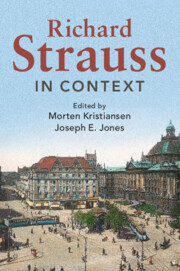Book contents
- Richard Strauss in Context
- Composers in Context
- Richard Strauss in Context
- Copyright page
- Contents
- Figures
- Notes on Contributors
- Preface
- Note on Translation
- Part I Family, Friends, and Collaborators
- Part II Career Stations
- Part III Cultural Engagement and Musical Life
- Chapter 14 Strauss as Reader
- Chapter 15 Antiquity
- Chapter 16 Philosophy and Religion
- Chapter 17 The Allgemeine Deutsche Musikverein
- Chapter 18 The Genossenschaft Deutscher Tonsetzer
- Part IV Professional and Musical Contexts
- Part V In History
- Part VI Artifacts and Legacy
- Further Reading
- Appendix: Letters Bibliography
- Index
Chapter 15 - Antiquity
from Part III - Cultural Engagement and Musical Life
Published online by Cambridge University Press: 08 October 2020
- Richard Strauss in Context
- Composers in Context
- Richard Strauss in Context
- Copyright page
- Contents
- Figures
- Notes on Contributors
- Preface
- Note on Translation
- Part I Family, Friends, and Collaborators
- Part II Career Stations
- Part III Cultural Engagement and Musical Life
- Chapter 14 Strauss as Reader
- Chapter 15 Antiquity
- Chapter 16 Philosophy and Religion
- Chapter 17 The Allgemeine Deutsche Musikverein
- Chapter 18 The Genossenschaft Deutscher Tonsetzer
- Part IV Professional and Musical Contexts
- Part V In History
- Part VI Artifacts and Legacy
- Further Reading
- Appendix: Letters Bibliography
- Index
Summary
This chapter explores the cultural, intellectual, and sociopolitical context surrounding Strauss’s operas based on Greek mythology: Elektra, Ariadne auf Naxos, Die ägyptische Helena, Daphne, and Die Liebe der Danae. Offering an overview of Germany’s cultural obsession with ancient Greece from the Enlightenment through the Third Reich, it highlights the changing nature of this engagement while pointing to ways in which German Hellenism informs an understanding of Strauss’s Greek-inspired operas. These works reflect broader cultural debates related to shifting German views of ancient Greece that range from a sunnier and more idealized portrait of the Greeks to a darker, more irrational one. This fundamental opposition between the Apollonian and the Dionysian impulses behind Greek tragedy plays out in these operas to one degree or another, while those composed during the Third Reich resonate with views of classical antiquity shaped by the Nazis' increasing focus on issues of race, ethnicity, and biological superiority that were tied to German identity.
Keywords
- Type
- Chapter
- Information
- Richard Strauss in Context , pp. 137 - 144Publisher: Cambridge University PressPrint publication year: 2020

